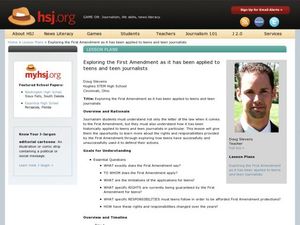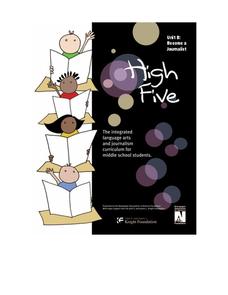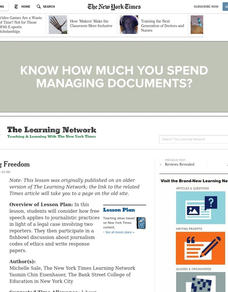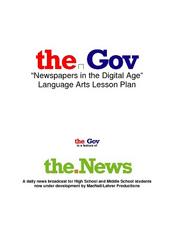Facing History and Ourselves
The Importance of a Free Press
"Congress shall make no law . . . abridging the freedom of speech, or of the press;. . ." Why is this guarantee of free speech and a free press the First Amendment to the US Constitution? Why are these rights so essential to a...
Curated OER
Exploring the First Amendment as it has been applied to Teen Journalists
Students explore the First Amendment as it has been applied to teens and teen journalists. In this First Amendment instructional activity, students memorize the First Amendment, complete online research of the topic, and quiz. Students...
Reporters Without Borders
2017 World Press Freedom Index
Freedom of the press was seen as a right so important that the Founding Fathers listed it as part of the first amendment to the United States Constitution. Americans pride themselves on this freedom, but just how free are American...
Curated OER
The First Amendment, What it Means and When Libel Comes in to Play
Students research three topics: The First Amendment, John Peter Zenger and his trial, and libel. In this journalism and libel lesson, students discuss things authority figures have done they disagree with and the anit-sedition law....
Curated OER
Citizen Journalism
Students examine the role of citizen journalism, freedom of the press, and the First Amendment. They analyze the results of an Internet survey, discuss the ethics of downloading copyrighted material on the Internet, and write a news story.
Social Media Toolbox
Why Social Media?
Is social media the best way to convey news in your school? Young journalists dig deep into the social media question in the second of 16 lessons from The Social Media Toolbox. After learning about the relationship between social media...
Online Publications
Become a Journalist
Explore the newspaper as a unique entity with a detailed and extended unit. The unit requires learners to consider the newspaper's role in democracy, think about ethics, practice writing and interviewing, and examine advertising and news...
Newseum
You Can’t Say That: Right to Know vs. Security Risk
Print or block? That is the question young journalists debate as part of their study of the freedom of the press. Half the class represents the journalists' legal team, and the other half represents the government's legal team. Teams...
Benjamin Franklin Tercentenary
Franklin’s Fair Hand American Journalism
Scholars know him for his role in the American Revolution, but Ben Franklin was also a journalist and printer. Learners investigate his standards for what was fit to print using primary sources—including writings where Franklin explains...
Newseum
Photo Ethics: News Independence
Young journalists read a case study about an annual school tradition of a streaker running across the football field after the homecoming game. Small groups then decide whether or not to cover the story and whether or not to include a...
Madison Public Schools
Journalism
Whether you are teaching a newspaper unit in language arts, covering the First Amendment and censorship in social studies, or focusing on writing ethics in journalism, a unit based on the foundations of journalism would be an excellent...
Teaching Tolerance
Journalism for Justice
Roll the presses! Or at least have your class members participate in the time-honored tradition of the student press by creating their own newspapers or journalist pieces on a social problem. After conducting research and collaborating...
American Bar Association
News Literacy Model Curriculum in Social Studies
Scholars investigate news literacy in the twenty-first century. They use technology, legal decisions, writings, and digital privacy to analyze the topic. Using what they learned, a group assignment looks into both the challenges and...
Facing History and Ourselves
Free Press Makes Democracy Work
A unit study of the importance of a free press in a democracy begins with class members listening to a podcast featuring two journalists, one from a United States public radio station and one from Capetown, South Africa. The lesson,...
Newseum
When the News Media Make Mistakes
Mistakes happen. When they happen in news reporting, be it in print or on the internet, journalism ethics requires that the errors be corrected. Young journalists use an Accuracy Checklist to track how news organizations post corrections...
Newseum
'The Press and the Civil Rights Movement' Video Lesson
Scholars watch a video featuring journalists who covered the civil rights movement, then respond to questions on a viewing guide. The video features interviews with participants and original news footage from the 1950s and 1960s. In...
Newseum
From the Front Page to the History Books
Young journalists compare news coverage of four major events with how the same events are covered in historical accounts. The ensuing discussion asks class members to compare and contrast the role of a reporter and the role of a historian.
Newseum
Is This Story Share-Worthy?
Young journalists use a "Is This Story Share-Worthy?" flowchart graphic to decide whether a story is worth sharing online. Instructors provide groups with fake news, poor quality stories, opinion pieces, biased news, and high-quality...
Newseum
Free Press Challenges Through History: Analyzing Historical Sources
The debate over the integrity of stories in media is not new. Young journalists analyze historical sources that reveal freedom of the press controversies and draw parallels to challenges freedom of the press faces today.
American Press Institute
Introductory News Literacy
Aspiring journalists learn about media literacy, journalism, and the press. Units come complete with handouts, assignment rubrics, notes, and extension suggestions. Each unit also comes with a list of vocabulary words and learning...
Curated OER
Press-ing Freedom
Students consider how free speech applies to journalistic practices in light of a legal case involving two reporters. They participate in a fishbowl discussion about journalism codes of ethics and write response papers.
Curated OER
Newspapers in the Digital Age
Is journalism more or less reliable with the influx of Internet sources? Learners investigate the issues of freedom of speech, journalistic ethics, and social responsibility in the age of Twitter and Facebook. After examining the...
Curated OER
Leaders in Journalism
Students examine the changing leadership roles and qualities of writers, journalists and editors in public life. They view short video clips by prominent journalists and read about various journalists in history.
Curated OER
Students Press Law and Ethics
Students research the rights and the responsibilities of journalists in dealing with First Amendment issues. In this First Amendment lesson plan, students research the Alien and Sedition Acts and study the five elements of...

























